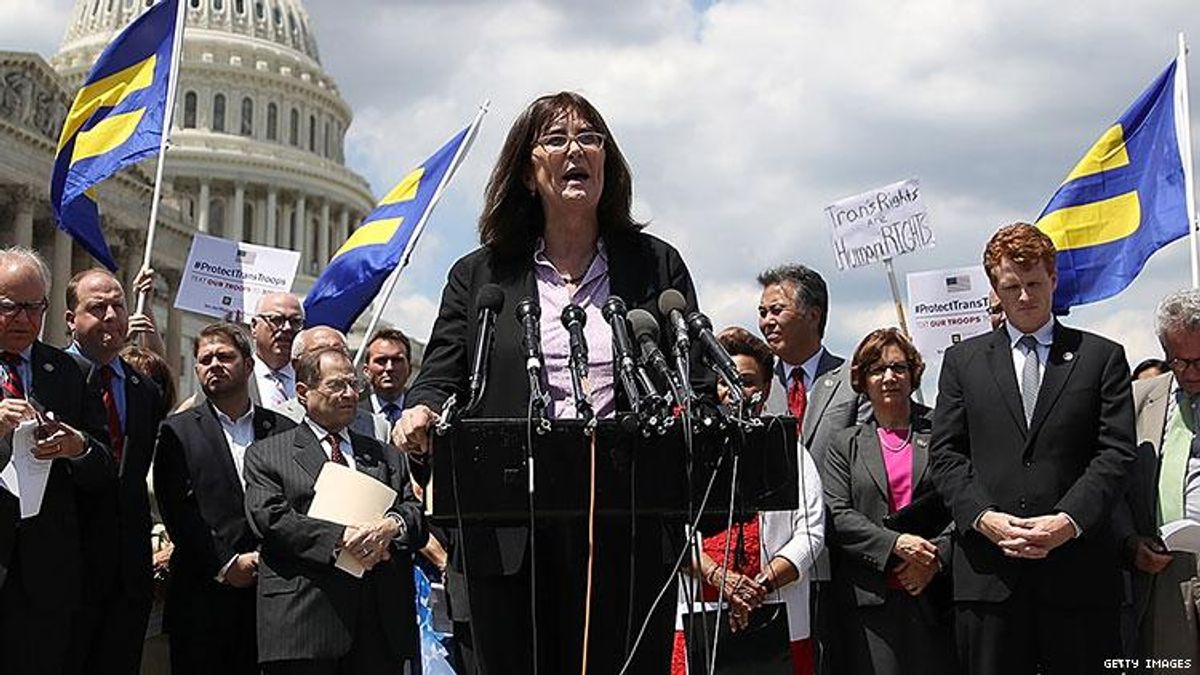The U.S. House of Representatives delivered a stinging rebuke to Donald Trump's transgender military ban today, voting 238-185 to approve a nonbinding resolution condemning it.
The resolution states that the House strongly opposes the president's "discriminatory ban" on trans service members, rejects the scientific claims behind the ban, and urges officials to not implement the policy. Democratic Rep. Joe Kennedy III of Massachusetts is lead sponsor of the successful resolution, which he introduced in February.
The vote was largely along party lines, but five Republicans joined most Democrats in support of the measure: John Katko (a cosponsor) and Tom Reed of New York, Trey Hollingsworth of Indiana, Brian Fitzpatrick of Pennsylvania, and Will Hurd of Texas. Two Democrats and six Republicans did not vote, and one Republican voted present.
All other Dems voted in favor of the resolution, and all remaining Republicans against it.
"Equal has always been this nation's north star," Kennedy, who chairs the House's Transgender Equality Task Force, said in a statement released after the vote.
Kennedy also appeared at a press conference following the vote, where he said, "Today we send a strong message to this president and the Department of Defense."
At the event, Mara Keisling, executive director of the National Center for Transgender Equality, noted that the vote shows trans people have friends on Capitol Hill, and she added, "We know what this ban is about, and it is not about military readiness ... what this is about is some people who want to marginalize transgender people."
Army Capt. Jennifer Peace, a transgender service member who appeared at the press conference, said the ban "is about discrimination based on something other than your service or your potential."
Another participant, Rep. Jan Schakowsky of Illinois, mentioned her trans grandson Isaac and thanked advocates for making the world safer for him, while House Majority Leader Steny Hoyer of Maryland said adoption of the resolution moves the nation closer to Martin Luther King Jr.'s vision of a place where people are judged only by the content of their character.
It remains to be seen if the Senate will approve such a measure, but bills that would take binding action to block the ban have been introduced in both the Senate and House.
However, it appears the ban will go into effect in April, even while four lawsuits against it move through the courts.
Judges hearing those suits had issued injunctions halting the ban while the cases proceeded, but as of this week all the injunctions have been invalidated. But the DoD issued a memo this month announcing its intention to implement the ban by April 12, when it will start discharging trans service members and denying enlistment to trans people, unless they're willing to serve in the gender to which they were assigned at birth.
The House's action today won praise from LGBTQ and other civil rights groups and the Democratic National Committee. A sampling of statements they issued:
"Transgender service members have been serving openly throughout the U.S. Armed Forces with distinction for years, and, with this vote, the House has made clear that they support transgender troops," said Human Rights Campaign National Press Secretary Sarah McBride. "We urge the U.S. Senate to take action so that every service member can know that the both chambers of Congress respect their service."
Former high-ranking officials from the Obama administration who had helped pass protections for LGBTQ people in the military during his presidency praised the resolution.
"The transgender military service ban not only undermines military readiness and national security, it is a violation of fundamental American values of fairness and equality," said Vanita Gupta, president and CEO of the Leadership Conference on Civil and Human Rights. "We applaud the House for speaking out and urge Trump to support all qualified individuals who volunteer to serve in our armed forces."
When the ban comes into full effect, an estimated 13,700 trans people will be kicked out of the military, out of an estimated 15,000 serving, unless the Senate is able to intervene through passing a similar resolution that could inspire Trump to reverse course, or by passing the bill to block the ban, although that could be vetoed by him.


















































































